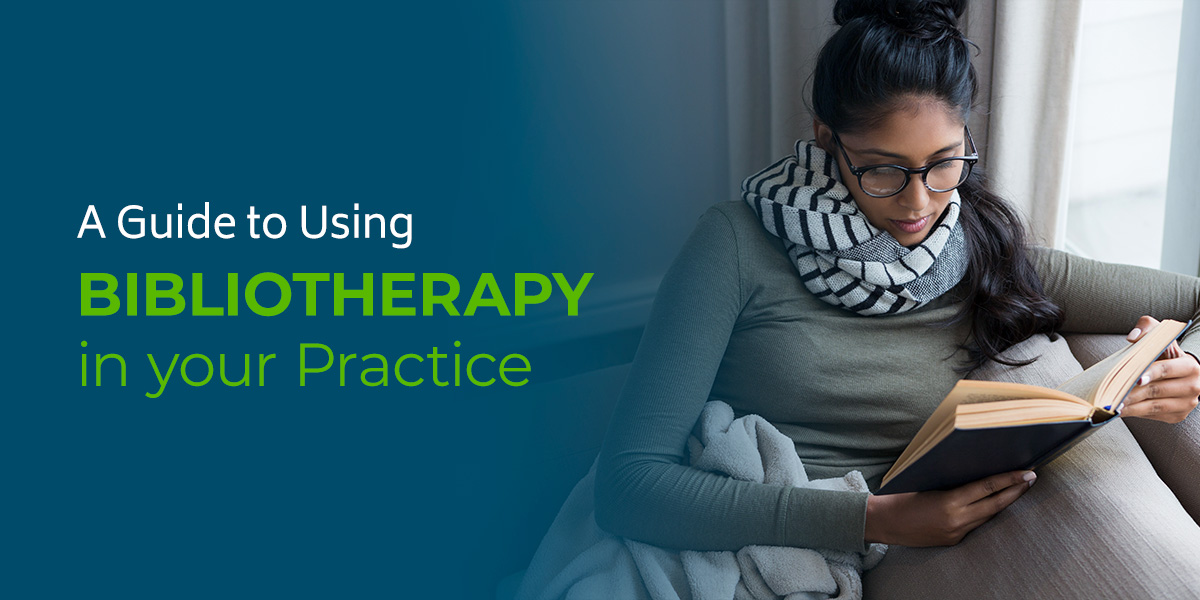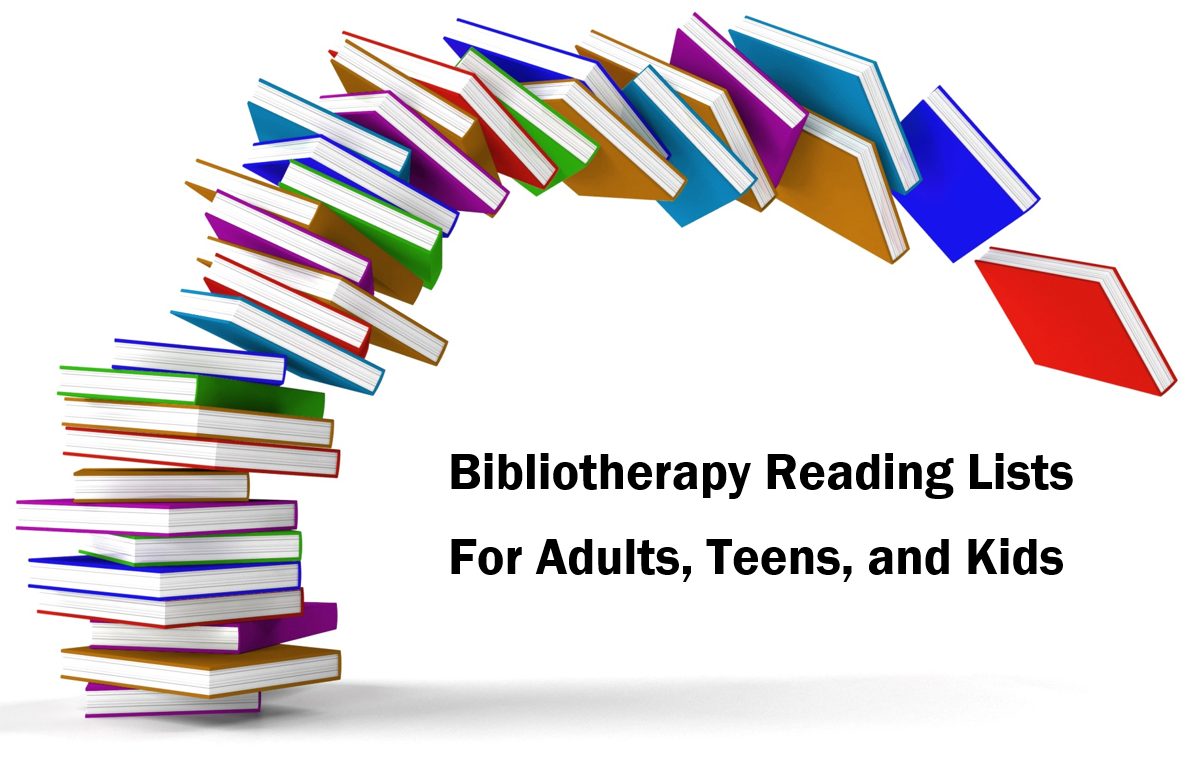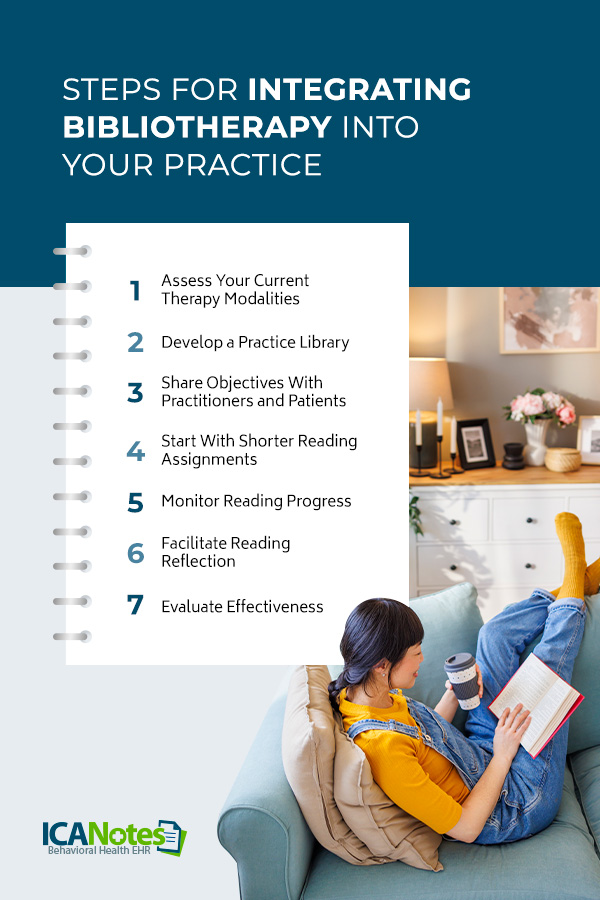
Using Bibliotherapy Books in Your Practice
Few activities are as soothing and engaging as sitting down with a great book, especially one that you can relate to and derive meaning from. Bibliotherapy books can enable therapists to leverage the magic of reading to enhance patient engagement and improve treatment outcomes.
This guide covers the ins and outs of introducing bibliotherapy to your mental or behavioral health practice and some key considerations for optimizing the use of this approach.
FREE Download: Bibliotherapy Book Lists for Adults, Teenagers, and Kids

What Is Bibliotherapy?
Bibliotherapy refers to a therapeutic approach that utilizes books to support an individual's emotional, psychological and mental health. Patients can read specific books, poems or other written works to gain new perspectives about their personal challenges.
Reading certain texts on relevant and connected topics can help individuals:
- Feel more connected or validated.
- Reflect on their circumstances.
- Gain insight into their own feelings and internal processes.
- Find practical advice and new coping skills.
Bibliotherapy books are sometimes used to enhance and complement other therapy modalities. The types of texts used depend on the patient's unique situation, needs and preferences. Some common genres include self-help, memoir, philosophy and fiction.
Who Are Bibliotherapy Books Best Suited For?
With an understanding of the bibliotherapy definition, it is easy to see why therapists may use this approach to connect with their patients on a deeper level. But who are bibliotherapy books meant for, and who can benefit from them most? In most cases, this therapy is best for individuals with mild to moderate mental health struggles.

Common Types of Bibliotherapy
You can offer various types of bibliotherapy to your patients. Some of the main categories include:
- Prescriptive bibliotherapy: Prescriptive or clinical bibliotherapy refers to utilizing self-help books to help a patient who is actively working to reduce negative thought patterns and behaviors.
- Creative bibliotherapy: This approach involves reading paired with creative expression through journaling, storytelling or other artistic activities to support greater emotional exploration and healing.
- Developmental bibliotherapy: A type of therapy focused on individuals at pivotal stages in their lives. The literature is often tailored to the specific age or life transition the patient is experiencing, helping them gain valuable coping skills and resilience.
- Therapeutic bibliography: The therapeutic bibliography approach involves establishing a reading list of different books that relate to an individual's goals, challenges and concerns to foster an ongoing journey of development and healing.
The Diverse Uses of Bibliotherapy Books
Bibliotherapy books and other reading materials can serve important and specific therapeutic purposes, including:
- Validation: Bibliotherapy enables patients to see themselves mirrored in the characters or stories they are reading. This allows individuals to feel more understood and less alone. As they read about situations similar to what they've faced in their own lives, they can ultimately find validation for their emotions, struggles and experiences.
- Comfort: Another use of this type of therapy is providing patients with a source of comfort. When an individual immerses themselves in a book or story that brings them solace and reassurance, they can bring that emotional relief into their daily lives.
- Depression: Bibliotherapy books for depression aim to address important themes of hope, resilience, self-compassion and self-care. The reading materials may offer insight into practical coping strategies for addressing depressive symptoms and maintaining a sense of optimism about life.
- Anxiety: Your practice can also use bibliotherapy for anxiety treatments. Reading topics focused on stress management and mindfulness can help individuals understand and recalibrate their emotional responses. The act of reading also provides a sense of calm and focus to combat negative thought patterns.
- Inspiration: Patients can benefit from engaging with uplifting stories that encourage them to pursue their goals despite the obstacles and personal strife they may need to overcome. Tales of triumph, resilience and perseverance can help the reader believe in their own potential.
- Motivation: Similar to using bibliotherapy for inspiration, your practice can also leverage this approach to help patients ignite a sense of purpose and determination. In learning about individuals who have accomplished big goals and made positive changes in their lives, readers can gain motivation to go after their dreams and objectives.
- Self-reflection: An excellent use of cognitive bibliotherapy is prompting introspection and reflection about one's life. Your patients can read books, poems or other stories that inspire them to look inward and gain clarity on their personal beliefs and values.
- Personal growth: Your practice can also use bibliotherapy to share stories of character development and growth that reflect the life transition a patient is currently experiencing. They can read to gain new perspectives on their journey while seeing a character embark on their own self-development adventure.
- Substance abuse: Reading can have profound impacts on those dealing with substance abuse. Your practice can suggest memoirs, recovery stories and educational materials. This kind of literature can offer powerful insights into addiction, the impacts of abuse and the hope of recovery.
- Self-harm and suicide: Another use of bibliotherapy is sharing stories with themes of resilience, hope and connection with patients dealing with self-harm inclinations. You can share books that share healthy and constructive ways of coping with distress and resources for healing a relationship with oneself.
- Disordered eating: You can also use bibliotherapy as a way to connect with patients dealing with disordered eating. Stories focused on self-acceptance, body image and successful recovery can help individuals feel less alone while nurturing a healthier relationship with food.
- Grief: Loss and mourning can feel extremely isolating. By sharing literature about the process with your patients dealing with grief, you can help them navigate these complex and heavy emotions, helping them feel less alone and find meaning in the healing process.
- Divorce: You can also leverage bibliotherapy books to help individuals going through a divorce. Suggest and assign reading materials based on separation, co-parenting or rebuilding one's life after a serious breakup. Books can offer solace, direction and support.
Key Bibliotherapy Benefits for Your Practice
Incorporating bibliotherapy books into your treatment can have many amazing benefits for your patients, from teaching them effective coping strategies to normalizing their personal struggles to inspiring greater empathy for other people's experiences. Your mental or behavioral health practice can also enjoy various advantages by introducing this modality to your therapy repertoire:
Enhancing Other Modalities
Bibliotherapy books can be a great addition to other forms of therapy, like cognitive behavioral and psychotherapies. They can be a wonderful supplementary tool for reinforcing important lessons or overcoming unique challenges. Your practice is able to leverage this approach to strengthen your other mental and behavioral care services.
Increasing Patient Engagement
Reading is a great way to boost engagement and inspire active introspection outside the confines of your practice. When a client leaves after an appointment, they may not reflect on their behaviors, actions and emotions as deeply until their next visit. Bibliotherapy encourages active participation in self-improvement and internal processing in normal daily life.
Plus, reading is a great way to spark up a conversation and discuss sensitive matters in a way that allows the patient to separate from their personal traumas and challenges.
Strengthing Patient-Therapist Understanding
The bibliotherapeutic relationship involves the patient, the therapist and the text. The client and care provider come from unique backgrounds, education levels and experiences, so they have unique takeaways from the exact same reading materials.
Through thorough discussion and relating back to the patient's situation, therapists can use this therapy technique to learn more about the people they are treating. The conversations that books, poems and articles inspire may otherwise never come up during a regular appointment. Bibliotherapy is a great way to strengthen patient-therapist understanding and relationships.
Steps for Integrating Bibliotherapy Books Into Your Practice
Follow these helpful steps and insights for successfully implementing bibliotherapy books into your mental or behavioral health practice:
1. Assess Your Current Therapy Modalities
Before rolling out a bibliotherapy program at your practice, begin by assessing the therapy modalities you currently offer to patients. Are there specific treatment approaches that bibliotherapy would enhance or complement? Do any of your practitioners have experience with this approach?
Consider starting small with a handful of patients to gain your bearings and determine the most beneficial uses of bibliotherapy for your specific practice.
2. Develop a Practice Library
Once you begin offering bibliotherapy, keep track of the books, stories, poems or articles your therapists find most helpful. You can curate a selection of reading materials to create a practice library.
After collecting a few books and stories, you'll be able to see if there are particular genres that would be beneficial to introduce. While self-help, philosophy and biographies can be very impactful for your patients, don't overlook the value that reading fiction books can provide. In fact, studies show that reading and discussing fiction can positively impact the reader's mental health and overall mood.
3. Share Objectives With Practitioners and Patients
To optimize the efficacy and impact of bibliotherapy books in your practice, be sure to share the goals and benefits of this approach with both your practitioners and patients. Discuss how these related readings can support the therapeutic process and help your clients take healing into their own hands.
A little education on bibliotherapy can go a long way in helping your patients engage with the content and find meaningful takeaways.
4. Start With Shorter Reading Assignments
As your therapists begin assigning reading to their patients, encourage them to begin by sharing shorter written works with their clients. Not all individuals enjoy reading or have an interest in doing it for their mental health, so sharing articles, poems or shorter stories to start can help them work up to more complex materials.
5. Monitor Reading Progress
After assigning reading homework to your patients, don't forget to monitor their progress and check in with them regularly to discuss what they are reading. Inquire about the thoughts and feelings the client noticed while reading, and encourage them to share their takeaways along the way as they work through longer materials. You can use the reading to guide talk therapy sessions or as a supplement for the client to gain new insights for their personal growth and development journey.
6. Facilitate Reading Reflection
One way to make bibliotherapy more effective is to guide patients through their assignments with different questions and prompts. During discussions, actively identify connections between the characters, story or situation in the reading with the patient's real-life experiences. Encourage clients to reflect and think critically about what they are reading.
7. Evaluate Effectiveness
After introducing bibliotherapy books to your practice, assess their impact on your patients and outcomes. Ask for feedback from patients to see whether or not they believe the reading you suggested was beneficial in helping them find a more positive outlook or gain useful coping skills.
4 Strategies for Enhancing Bibliotherapy Techniques
If you are looking to increase the impact of your practice's approach to using bibliotherapy, explore the following tips and tricks:
1. Share Tailored Bibliotherapy Book Recommendations
Therapists should also carefully and mindfully select reading assignments for their clients. Some key considerations to keep in mind include the individual's triggers, interests, age and reading level. Do your due diligence. Research each title online and select specific literary work that will resonate with the patient's unique concerns, struggles or goals.
2. Encourage Active Reading Strategies
When assigning a bibliotherapy book to a particular client, encourage them to be an active reader as much as possible. One of the best methods for doing this is keeping a journal. Readers can reflect on what they've read, keep track of passages that stood out to them and record discussion points to review during their next appointment.
3. Consider Group Discussions
Another way your practice may be able to enhance its approach to bibliotherapy is by creating discussion groups. This could be in the style of group therapy, guided chats or book club. Invite patients dealing with similar situations to join together and foster a dialogue about what they've been reading. This can create a strong sense of community.

4. Celebrate Patient Successes
Acknowledging your client's achievements, breakthroughs and small wins can give them the motivation they need to continue persevering and healing. As an individual works through bibliotherapy book assignments, give them plenty of encouragement and recognize their efforts. You can inspire them to engage more deeply with the reading materials and self-reflection.
Why Mental and Behavioral Health Professionals Can Trust Us
With over 25 years in business, ICANotes understands the unique needs of organizations and clinicians working in behavioral and mental health. We know the stressors and inconveniences of managing your practice and keeping up with patient documentation.
Our electronic health record (EHR) solution features various dynamic software tools designed by expert clinicians specifically for the legal and industry requirements of mental and behavioral health care. With decades of experience under our belts, we created the ICANotes software to be extremely intuitive and organized to deliver greater convenience across many of your practice operations.
We want to help you save valuable time, money and energy by taking advantage of our industry-leading behavioral health EHR. We've used our industry expertise to streamline your daily operations so you can focus on what matters most — providing outstanding care to your patients.
Take Your Therapy Practice to the Next Level With ICANotes Behavioral Health EHR
If you're looking to introduce new therapy modalities like bibliotherapy to your therapeutic arsenal, turn to the behavioral health software from ICANotes.
Our EHR solution features a fully integrated practice management system to help you streamline daily operations, so you save valuable time and energy previously spent filling out paperwork and completing administrative tasks. Our solutions are designed to help you dedicate more time and deliver higher-quality care to your patients.
Are you interested in learning more? Sign up for a free trial of the ICANotes behavioral health EHR today!
Sources:
https://www.psychologytoday.com/us/therapy-types/bibliotherapy
https://www.ncbi.nlm.nih.gov/pmc/articles/PMC8993009/
https://www.icanotes.com/2022/12/29/grief-treatment-plans/
https://www.tandfonline.com/doi/full/10.1080/08893675.2021.2004371
https://www.icanotes.com/about-us/
https://www.icanotes.com/features/practice-management/
https://www.icanotes.com/free-trial/













